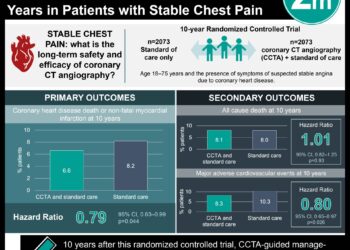Chest pain may be better than EKG, echo for predicting coronary artery disease prognosis
1. Among patients with stable coronary artery disease in the outpatient setting, the presence of chest pain, known as angina, was a better predictor of cardiovascular mortality or myocardial infarctions compared to the presence of myocardial ischemia seen on noninvasive testing (stress electrocardiogram, stress echocardiogram, or nuclear imaging).
2. As might be expected, the presence of both anginal symptoms and myocardial ischemia had the strongest association with cardiovascular mortality and myocardial infarctions.
Evidence Rating Level: 2 (Good)
Study Rundown: In the past few decades, a wide array of medications and invasive treatments has dramatically changed the management of coronary artery disease (CAD). This, in turn, may have the changed the presentation and prognostic indicators of the disease. This study was conducted to help determine how the anginal symptoms and myocardial ischemia related to outcomes in patients with coronary artery disease in the outpatient setting. Results suggest that anginal symptoms are a better predictor of cardiovascular (CV) mortality or myocardial infarctions (MIs), compared to the presence of myocardial ischemia seen on testing. This was an unexpected finding since clinicians often rely on ischemic changes for prognostic purposes. The presence of both anginal symptoms and myocardial ischemia had the strongest association with CV mortality and MIs.
The large size of the cohort is a major strength of the study. However there were no patients from the US, which affects the generalizability of the population. The study population was well characterized in terms of their demographics and symptoms, but the physicians did not use standardized questionnaires to determine the presence of angina. However, clinical judgment of anginal symptoms from patient history is more similar to clinical practice than using questionnaires. Lastly, since a large number of patients had baseline heart failure, it is possible that their symptoms were classified as being “anginal”, which would affect the results. However, this also reflects a more real world scenario.
Click to read the study, published today in JAMA Internal Medicine
Relevant Reading: Inducible Ischemia and the Risk of Recurrent Cardiovascular Events in Outpatients With Stable Coronary Heart Disease: The Heart and Soul Study
In-Depth [prospective cohort]: The study population consisted of 32,105 patients enrolled by the Prospective Observational Longitudinal Registry of Patients with Stable Coronary Artery Disease (CLARIFY) registry, from 45 countries across the world (not including the US). The enrollment period spanned from November 2009 to June 2010, and the median follow up length was 2 years. The physicians selected were cardiologists or primary care physicians in the outpatient setting. The Canadian Cardiovascular Society classification for angina was used for characterization, along with any available invasive or noninvasive cardiovascular testing. The primary outcome was a composite of CV mortality or MI.
Among the studied population, 63.2% had undergone testing for myocardial ischemia within the 12 months prior to enrollment. After adjusting for baseline differences between those who underwent testing and those who did not, the hazard ratio for the primary outcome was 0.7 (P<0.001) in favor of the group that had undergone testing. The main results of the study were derived from the subset of patients who did undergo testing for myocardial ischemia. Patients who had inducible ischemia but no anginal symptoms did not have a significantly higher rate of the primary outcome (P=0.47). However, patients who had anginal symptoms but no evidence of ischemia had a significantly higher risk of CV mortality or MI (HR 1.45; 95% CI, 1.08-1.95; P=0.01). Patients who had both angina and ischemia on testing had the highest risk of the primary outcome (HR 1.75; 95% CI, 1.34-2.29; P<0.001).
More from this author: Strict blood pressure control in kidney disease linked to worse outcomes, Catheter thrombolysis + anticoagulation may be inferior to anticoagulation alone in DVT, Pediatric brain injury unlikely with isolated loss of consciousness, Ultrasound, flow reserve guided coronary interventions provide minimal benefit, Resveratrol levels not linked with decreased mortality (InCHIANTI Trial)
Image: PD
©2012-2014 2minutemedicine.com. All rights reserved. No works may be reproduced without expressed written consent from 2minutemedicine.com. Disclaimer: We present factual information directly from peer reviewed medical journals. No post should be construed as medical advice and is not intended as such by the authors, editors, staff or by 2minutemedicine.com. PLEASE SEE A HEALTHCARE PROVIDER IN YOUR AREA IF YOU SEEK MEDICAL ADVICE OF ANY SORT.



![PFO closure equivalent to medical management in prevention of recurrent stroke [PC and RESPECT trials]](https://www.2minutemedicine.com/wp-content/uploads/2013/03/Echokardiogram_von_Atriumseptumdefekt_Ostium_secundum1-350x250.jpg)



